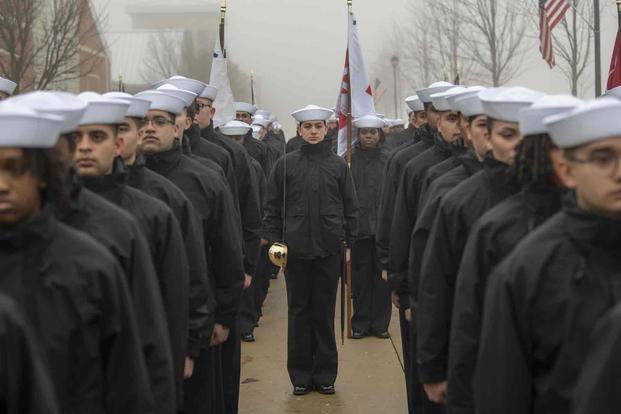The Navy is no longer immediately kicking out recruits who arrive at boot camp at Recruit Training Command in Great Lakes, Illinois, with detectable amounts of marijuana in their system.
The service has expanded the authority to grant waivers for any recruits who initially test positive for THC, the main psychoactive compound in marijuana, Rear Adm. James Waters, the director of the Navy's military personnel plans and policy division, told a group of reporters Thursday.
"If they fail that test and own up -- 'Yes, I smoke marijuana '-- we do an evaluation of the young person to make sure there's not something else going on," Waters said. "But we trust that through the process of boot camp that we have an opportunity to bring them along with our culture."
Read Next: All 5 Marines Aboard Downed Helicopter in California Were Killed in Crash, Service Says
Waters explained that the move was driven in part to be "reflective of where legislation is in society." "We recognize that many states have legalized marijuana," he said.
However, the admiral stressed that there are no conversations about offering a similar leniency for any other drugs and noted that "we don't do drugs in the military."
The move joins a host of other recent changes that the Navy has put in place to help reduce the number of sailors who drop out of boot camp and are unable to continue on in their military career. The result is that the current dropout rate in boot camp is around 10% -- one of the lowest in recent history.
The move to decrease the number of recruits that the Navy loses throughout the boot camp process is part of its effort to deal with the recruiting crisis that has plagued all the services for the last several years.
Waters' boss, Vice Adm. Rick Cheeseman, has previously said that only about 10% of scheduled recruiter appointments convert into sailors entering the delayed-entry program or boot camp after about five months.
While that percentage increases if the potential recruit has mentorship from someone with Navy experience, according to Cheeseman, the sea service is still looking to minimize any further losses as those interested civilians become recruits and, eventually, sailors.
"If we're going to recruit 40,000 sailors," Waters said, referring to the Navy's recruiting goal for 2024, losing 4,000 recruits through boot camp "is really, really unhelpful and so we want to try to continue to work on that."
In addition to being more accepting of positive THC results, Waters noted that the pre-boot camp physical training regimen that the Navy borrowed from the Army is yielding results as well.
"We have about 400 additional sailors in the Navy today because of the physical Future Sailor Prep Course," Waters said.
Navy officials also noted that the prep course is having a secondary, positive impact on boot camp by injecting recruits with even just a few more weeks of Navy experience into the ranks of boot camp divisions.
"I think having some of those young men and women to the right or left of you that kind of experienced [the Navy] a little bit helps tremendously to reduce that anxiety," Force Master Chief Delbert Terrell told reporters.
"Recruit division commanders are actually competing for these kids as they come out of the Future Sailor Prep Course because they're more ready to run and lead in the boot camp," Waters added.
In February 2023, the Navy also started to allow recruits to use alternative cardiovascular exercises to pass that component of the physical fitness test. In the fleet, sailors are able to complete that fitness requirement by swimming, biking or rowing, among other options.
Before this change, sailors in boot camp were able only to run for their first test in the Navy.
"We went from losing 400 to 500 a year because they couldn't finish the run to ... one," Waters said. "All it took was buying some bikes."
Waters also says that he's not satisfied with the 10% dropout rate. "I want to get past that," he said.
"I think Adm. [Craig] Mattingly, who is the commander there [at Great Lakes] wants to get past that," he added.
Related: Navy's Personnel Boss Argues Dropping High School Diploma Requirement Has 'Minimal' Risk











